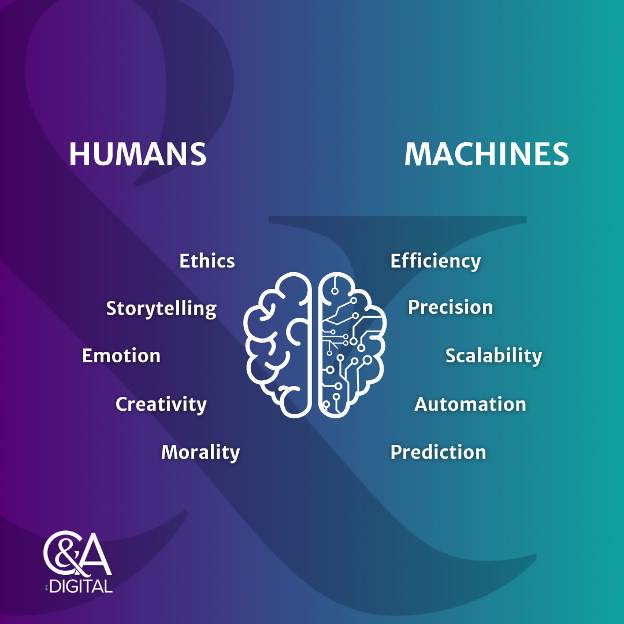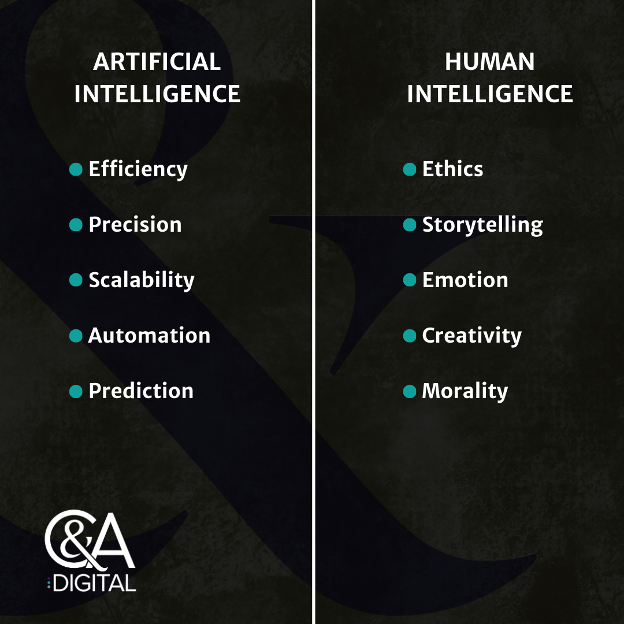Welcome back to the Marketing Playground! This month, we’ll explore why the human element remains crucial in an AI-driven world. AI is becoming an essential part of the digital landscape, and as marketers, we must embrace its integration. While some fear it may replace creativity and intuition in marketing, what if it’s here to amplify our strengths instead?
It’s time to play.
In a survey of 200 corporate strategy leaders, 79% agreed that the use of AI, automation, and analytics will be critical to their success over the next two years. Yet only 20% of them reported using AI in their day-to-day work. (Gartner)
The Human Role in AI Integration
AI excels at handling data and performing repetitive tasks with remarkable efficiency. But it cannot do what we can—bring depth to narratives, nurture connections, and address ethical issues. As AI continues to grow and integrate into various roles, the apprehension surrounding it intensifies. However, there’s a clear difference between exercising caution and succumbing to fear. Human creativity, individuality, and thought leadership provide a guidance and balance that AI simply cannot replicate.

Why AI Relies on Us More Than We Rely on It
AI has the potential to help us gather and target data more efficiently. Still, human oversight is crucial to maintaining quality. The human brain, a rich source of creativity and innovation, skillfully combines logic with the essence of imaginative thought. Our oversight is also vital for tackling privacy, discrimination, and bias issues.
AI will never completely replace traditional marketing tools; it simply can’t mimic the tangible experiences they offer. Many consumers still deeply value the familiarity of printed materials and face-to-face interactions, preferring something they can physically engage with. For this reason, it is important to adopt a balanced approach of combining both traditional and digital methods. The goal is not to replace existing tools but to enhance the customer experience through various touch points.
Much like a vehicle, AI can swiftly transport us to our destinations, but we must select the right fuel and navigate carefully to prevent mishaps. With our appropriate and intentional guidance, we can ensure a safe and ethical journey.
AI certainly has the power to enhance human creativity and make it more captivating. I was recently part of a panel with top marketing executives that addressed AI and marketing, and spoke about an innovative tool called HeyGen, that enables limited-team marketers to create video content. This tool includes features like customizable avatars, support for multiple languages, and the ability to transform text into videos. The key to effectively leveraging AI is to use it as a complement to human skills rather than replacement for them.
By leveraging tools like this, marketers (and agencies) can:
· Create personalized, engaging content
· Save time on production
· Expand reach to a larger and more diverse audience
We Are in Charge of Shaping the Future of AI
Let’s remember who is in control here. This is is not a moving and we are not being overtaken. We are responsible for ensuring that AI is used ethically and responsibly. Us humans must interpret the data, make informed decisions about its use, and ensure our campaigns respect consumer rights and values. AI could unintentionally perpetuate harmful stereotypes, invade privacy, or plagiarize content without human oversight. Our role in guiding AI is not just necessary; it is essential to the process, positioning us as the driving force behind its ethical application.

In my marketing journey, I’ve seen that while AI can boost efficiency and help me dig into data, the human touch is what makes a difference for my clients. It’s all about using AI as a tool, mixing technology with empathy, creativity, and moral insight to genuinely connect with people.
Until next time, thanks for coming out to play.
